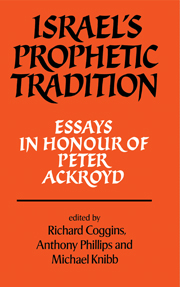Book contents
- Frontmatter
- Contents
- Preface
- Biographical note
- Abbreviations
- Note
- Prophecy in the ancient Near East
- The origins of prophecy in Israel
- Three classical prophets: Amos, Hosea and Micah
- The Isaiah tradition
- An alternative prophetic tradition?
- Visionary experience in Jeremiah
- The Ezekiel tradition: prophecy in a time of crisis
- The prophets of the restoration
- Prophecy and the emergence of the Jewish apocalypses
- Prophecy and wisdom
- Prophecy and the cult
- Prophecy and law
- A change of emphasis in the study of the prophets
- Martin Buber and the interpretation of the prophets
- Index of Biblical References
The origins of prophecy in Israel
Published online by Cambridge University Press: 09 January 2010
- Frontmatter
- Contents
- Preface
- Biographical note
- Abbreviations
- Note
- Prophecy in the ancient Near East
- The origins of prophecy in Israel
- Three classical prophets: Amos, Hosea and Micah
- The Isaiah tradition
- An alternative prophetic tradition?
- Visionary experience in Jeremiah
- The Ezekiel tradition: prophecy in a time of crisis
- The prophets of the restoration
- Prophecy and the emergence of the Jewish apocalypses
- Prophecy and wisdom
- Prophecy and the cult
- Prophecy and law
- A change of emphasis in the study of the prophets
- Martin Buber and the interpretation of the prophets
- Index of Biblical References
Summary
An essay on the origins of Israelite prophecy must necessarily concern itself with at least three distinct, though not wholly unrelated, issues. First, there are the historical problems as to when it is possible to date the emergence of what may be called ‘prophecy’ in Israel and the factors that led to its appearance there. Secondly, there is the phenomenological question of how far we can recover the characteristics and functions of prophecy before the eighth century, its role in society, its relation to the cultus and similar matters. Thirdly, we have to ask to what extent we can extract authentic and reliable information about the actual careers and activities of the most important ‘prophetic’ figures who are placed in this period, such as Samuel, Elijah or Elisha, from the material that the Old Testament provides concerning them.
It must be admitted that comparatively little attention has been paid to these issues in the scholarship of the last twenty-five years or so, as is noted in the most recent survey of prophecy, which in fact devotes virtually no attention to the notices of prophecy in the historical books of the Old Testament (McKane, 1979, pp. 163ff). To some extent, investigation in this area has reached a dead end, so that no recent work has superseded the famous essay of H. H. Rowley on the nature of Old Testament prophecy (Rowley, 1952).
- Type
- Chapter
- Information
- Israel's Prophetic TraditionEssays in Honour of Peter R. Ackroyd, pp. 12 - 31Publisher: Cambridge University PressPrint publication year: 1982



